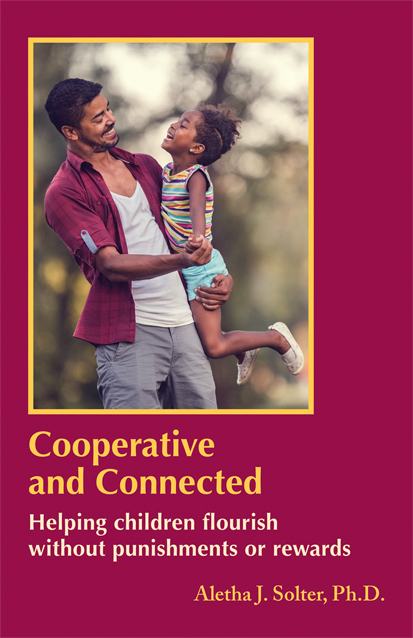How can I talk to my child about sex?
by Aletha Solter, Ph.D.
Question:
I'm looking for literature to help me prepare for "the talk" with my nine-year-old daughter. Everything I read says it needs to come from me, and that it will come up. Well, it hasn't come up, and I don't want her information coming from the kids on the school bus. Thanks.
Answer:
When you say "the talk" it is not clear whether you mean a discussion about menstruation or about sexuality. I will assume that you mean both.
It is a mistake to think that everything about puberty, love, sexuality, reproduction, birth control, and sexual orientation can all be explained to a child in one single talk. Instead, try to make use of "teachable moments" that arise in the context of everyday life, such as a pregnancy in your family or something in the news about pregnancy and abortion. Those would be excellent times to bring up the subject of sexuality. It's okay to give your daughter information in bits and pieces. You don't need to explain everything all at once.
One way to begin is to ask your daughter how much she already knows. She might know more than you think. Perhaps you can say: "Did you see this picture in the news of the birth of quadruplets? Do you know how that can happen?" Then listen to her and add the information she lacks. This can lead to a discussion of sexuality. Perhaps she knows that a "seed" from the father joins with a "seed" from the mother but doesn't know how the "seeds" get together. A brief description of sexual intercourse can be a part of such a discussion. (The word "seed" is actually not a good one to use. It is better to use correct physiological terms right from the start, such as sperm, egg, penis, vagina, etc.)
The discussion can also begin with a talk about bodies and sex differences. Ideally, this should begin as early as age two or three. Seeing siblings, friends, or parents naked is a good way to let children learn about differences between males and females. Girls need to be encouraged to become familiar with their own bodies and to know what various orifices are for. It is a good idea for mothers to casually mention menstruation to their daughters from time to time, beginning when the girls are little, so they will know that this is a normal part of being female. (It doesn't hurt to let boys know about this as well.) If you have not yet discussed menstruation with your daughter, do not wait any longer. Some girls are now starting their periods as early as age nine.
Another good way to start a discussion about these topics is to read a book to your daughter about puberty, sexuality, and reproduction. There are many excellent books for children and parents to read together.
After you have read a book with your child, do not assume that you have completed her sex education. There is always more to learn and discuss. You can read additional books together and continue to make use of "teachable moments" as she grows older. Bring up the subject from time to time, and feel free to share your own values with your child. Encourage her to think about controversial issues and ask for her opinion. Don't wait for her to ask questions. She needs this information but might not dare bring up the subject. If you feel embarrassed while discussing these things, tell her so, but don't let that stop you. The subject is far too important to ignore.
About Aletha Solter:
Aletha Solter, PhD, is a developmental psychologist, international speaker, consultant, and founder of the Aware Parenting Institute. Her books have been translated into many languages, and she is recognized internationally as an expert on attachment, trauma, and non-punitive discipline.
Aware Parenting is a philosophy of child-rearing that has the potential to change the world. Based on cutting-edge research and insights in child development, Aware Parenting questions most traditional assumptions about raising children, and proposes a new approach that can profoundly shift a parent's relationship with his or her child. Parents who follow this approach raise children who are bright, compassionate, competent, nonviolent, and drug free.
